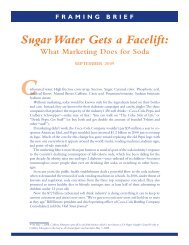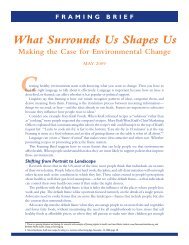Digital and Social Media Marketing Promotion of Beer and Liquor ...
Digital and Social Media Marketing Promotion of Beer and Liquor ...
Digital and Social Media Marketing Promotion of Beer and Liquor ...
You also want an ePaper? Increase the reach of your titles
YUMPU automatically turns print PDFs into web optimized ePapers that Google loves.
<br />
<br />
<br />
<br />
<br />
<br />
Contact: Jeff Chester, CDD, 202-494-7100<br />
jeff@democraticmedia.org <br />
<strong>Digital</strong> <strong>and</strong> <strong>Social</strong> <strong>Media</strong> <strong>Marketing</strong> <strong>Promotion</strong> <strong>of</strong> <strong>Beer</strong> <strong>and</strong> <strong>Liquor</strong> <br />
Threatens Youth, new report warns <br />
Consumer <strong>and</strong> health groups call on FTC <strong>and</strong> state attorneys general for <br />
action; will announce recommendations at May 18 news conference <br />
<br />
May 18, 2010: Alcohol companies are using the latest new media technologies to <br />
promote their products using methods that appeal to youth, explains a new report <br />
released today from the Center for <strong>Digital</strong> Democracy <strong>and</strong> Berkeley <strong>Media</strong> Studies <br />
Group <strong>of</strong> the Public Health Institute. “Alcohol <strong>Marketing</strong> in the <strong>Digital</strong> Age,” details <br />
how beer <strong>and</strong> alcohol companies are targeting consumers through social media, <br />
online video, mobile phone applications, <strong>and</strong> virtual online communities. Marketers <br />
are using these <strong>and</strong> other digital tools to harvest behavioral <strong>and</strong> other data on <br />
consumers, raising concerns about the effects such personalized interactive <br />
marketing may have on underage drinking, which The Center on Alcohol <strong>Marketing</strong> <br />
<strong>and</strong> Youth estimates to account for 12‐20 percent <strong>of</strong> the U.S. alcohol market. The <br />
report also examines how alcohol companies are targeting African Americans <strong>and</strong> <br />
Hispanics. <br />
<br />
Consumer <strong>and</strong> public health groups Center for <strong>Digital</strong> Democracy <strong>and</strong> Berkeley <br />
<strong>Media</strong> Studies Group sent a copy <strong>of</strong> the report today to the FTC, urging immediate <br />
action. <br />
<br />
Key findings from report <strong>and</strong> additional recommendations will be delivered in an <br />
online news conference today, May 18 at 1 p.m. EDT. To register, go to <br />
https://publichealthinstitute.webex.com/publichealthinstitute/onstage/g.php?t=a&<br />
d=968400971. The full report will become available the same day at <br />
www.digitalads.org/alcohol.php. <br />
<br />
The following are among the many digital marketing examples included in the <br />
report: <br />
<br />
• Heineken created a virtual world housing <strong>and</strong> entertainment complex called <br />
Heineken City, where a consumer could obtain an “apartment,” along with <br />
free storage <strong>and</strong> email services. The size <strong>of</strong> one’s apartment was determined <br />
by earning points played on Heineken‐br<strong>and</strong>ed games.
• Molson Coors <strong>and</strong> other alcohol beverage companies are using the latest <br />
“social media monitoring” tools to track, analyze <strong>and</strong> better target consumers <br />
who use Facebook, MySpace <strong>and</strong> other social media sites. <br />
• Smirn<strong>of</strong>f, Budweiser <strong>and</strong> others are using YouTube <strong>and</strong> other online sites to <br />
<strong>of</strong>fer videos designed to become viral marketing vehicles. <br />
• Malibu rum’s free iPhone game “Get Your Isl<strong>and</strong> On” explains that you can <br />
“Bowl in a rum shack. Bowl on the beach. Bowl in an underground cave or <br />
inside an aquarium. We’ve taken the Malibu Bottles <strong>of</strong>f the bar, <strong>and</strong> made <br />
them part <strong>of</strong> the game…. The controls are simple. Enter your age (tell the <br />
truth!), decide where you want to play, if you want to play alone or with a <br />
friend, just grab yourself a ball…. You can turn up the volume, <strong>and</strong> if you like <br />
the music, you can download the ring tones at Malibu‐rum.com. When you <br />
bowl with Malibu® Rum the lanes are always smooth, <strong>and</strong> the cocktails are <br />
always tasty!” <br />
• Bud Light became a sponsor in ESPN’s “Zoom” casual games platform <br />
available online <strong>and</strong> as part <strong>of</strong> a “free app” for mobile phones. Zoom <strong>of</strong>fers an <br />
array <strong>of</strong> games, including Air Hockey, Craps, Vector Runner, Ping Pong, Day <br />
Drive, Trick Hoops Challenge, Speed Back, <strong>and</strong> Club 300 Bowling, which are <br />
integrated with multiple forms <strong>of</strong> digital advertising. <br />
<br />
“The alcohol industry’s digital <strong>and</strong> social media marketing tactics are blurring the <br />
boundaries between advertising <strong>and</strong> content with unprecedented sophistication, <br />
report co‐author <strong>and</strong> Center for <strong>Digital</strong> Democracy executive director Jeff Chester, <br />
MSW said. “The FTC <strong>and</strong> state attorneys‐general should launch an investigation into <br />
this new threat to young people online.” <br />
<br />
“This report should open the eyes <strong>of</strong> policy makers <strong>and</strong> parents everywhere,” David <br />
Jernigan Ph.D., associate pr<strong>of</strong>essor at the Johns Hopkins Bloomberg School <strong>of</strong> Public <br />
Health, said. “Allowing alcohol companies to regulate themselves isn’t effective at <br />
keeping advertising from reaching kids, <strong>and</strong> age verification efforts don’t work. It <br />
doesn’t take much imagination for kids to fib about their birthday before entering a <br />
website.” <br />
<br />
“The alcohol industry’s latest marketing tactics make TV advertising look mild,” said <br />
report co‐author <strong>and</strong> director <strong>of</strong> Berkeley <strong>Media</strong> Studies Group, Lori Dorfman, DrPH. <br />
“All the evidence showing that marketing influences kids to drink was generated <br />
examining old media. With aggressive under the radar tactics like mobile <strong>and</strong> social <br />
media marketing campaigns, parents don’t st<strong>and</strong> a chance, let alone their kids.” <br />
<br />
“Today’s young people are living much <strong>of</strong> their lives online,” commented Kathryn <br />
Montgomery, PhD, pr<strong>of</strong>essor <strong>of</strong> communication at American University, <strong>and</strong> one <strong>of</strong> <br />
the report’s co‐authors. “With concerns about binge drinking <strong>and</strong> other dangerous <br />
behaviors among under age youth, public health pr<strong>of</strong>essionals <strong>and</strong> policy makers <br />
must investigate these aggressive new alcohol marketing practices on social <br />
networks, mobile phones, <strong>and</strong> other digital media so popular with children <strong>and</strong> <br />
teens.”
<br />
Today, CDD <strong>and</strong> BMSG sent the report to <strong>of</strong>ficials at the Federal Trade Commission <br />
<strong>and</strong> the National Association <strong>of</strong> Attorneys General (NAAG). Both the FTC <strong>and</strong> NAAG <br />
were urged to launch investigations into the digital marketing practices <strong>of</strong> alcohol <br />
beverage companies, including their use <strong>of</strong> social media, data collection, <br />
neuromarketing, <strong>and</strong> online targeting. Among the companies cited to be included in <br />
the investigations are Google/YouTube <strong>and</strong> Facebook. The groups also asked the <br />
FTC to assess the adequacy <strong>of</strong> age‐verification mechanisms <strong>and</strong> for the alcohol <br />
industry to strengthen its self‐regulatory codes. <br />
<br />
The report was co‐written by Jeff Chester, MSW, executive director <strong>of</strong> the Center for <br />
<strong>Digital</strong> Democracy, Kathryn Montgomery, PhD, a public communication pr<strong>of</strong>essor at <br />
American University, <strong>and</strong> Lori Dorfman, director <strong>of</strong> BMSG, a project <strong>of</strong> the Public <br />
Health Institute. Chester <strong>and</strong> Montgomery’s research <strong>and</strong> advocacy efforts during <br />
the 1990s led to the passage <strong>of</strong> the Children’s Online Privacy Protection Act <br />
(COPPA), currently being reviewed by the FTC. <br />
<br />
The research was supported by the Substance Abuse Policy Research Program <strong>of</strong> the <br />
Robert Wood Johnson Foundation. <br />
<br />
<br />
<br />
<br />
<br />
<br />
###









